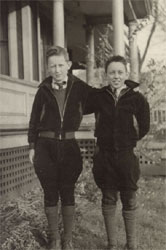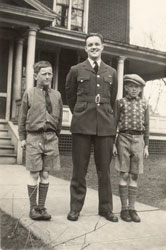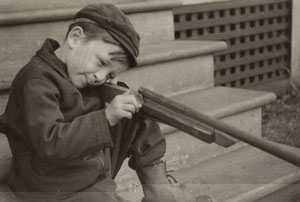 Gerard Dalton was still in elementary school when the war started. He lived with his large family in the only house on Prince Street, close to the town's Memorial Square named to commemorate the veterans of the First World War. It was a popular play area for the neighbourhood kids. One of the attractions was the tower erected for the fire siren. It was a contest to climb to the top despite their mother's warnings to stay away. The World War I guns were a magnet for boys as well. The guns at that time still had movable parts and the kids would pull down the steps and climb up into the seats to fight imaginary battles.
Gerard Dalton was still in elementary school when the war started. He lived with his large family in the only house on Prince Street, close to the town's Memorial Square named to commemorate the veterans of the First World War. It was a popular play area for the neighbourhood kids. One of the attractions was the tower erected for the fire siren. It was a contest to climb to the top despite their mother's warnings to stay away. The World War I guns were a magnet for boys as well. The guns at that time still had movable parts and the kids would pull down the steps and climb up into the seats to fight imaginary battles.He recalls that it was so common to see men in uniform that he and his friends just took it for granted. They used to like the challenge of identifying the ranks. Most of his school pals had older family members involved in the military and there was lots of talk about who they were and what they were doing. War was very much on the minds of children. His family listened to radio broadcasts for war news three times a day - morning, noon, and suppertime. There was always a report of fighting in Europe with the number of casualties.
 Some of the rooms in the Dalton house were rented out to local airmen. One roomer left an English bicycle behind as a rent payment and it came into regular use as a delivery vehicle for the drug store business of J. E. Dalton. Gerard and his brother Edward used the bike to deliver parcels after school and at times were allowed to take it out for recreation.
Some of the rooms in the Dalton house were rented out to local airmen. One roomer left an English bicycle behind as a rent payment and it came into regular use as a delivery vehicle for the drug store business of J. E. Dalton. Gerard and his brother Edward used the bike to deliver parcels after school and at times were allowed to take it out for recreation.Gerard remembers collecting paper for salvage and saving toothpaste tubes. Rationing meant that "cookies were scarce" and the hope of having a lemonade stand was not fulfilled. He had his own special war stamp booklets, but never cashed them in himself. His older sister used them towards the purchase of a fur coat and had to compensate him later. In addition to saving stamps, he had a small collection of small cards showing Canadian ships. They came in packages of Corvette cigarettes that he would smuggle out of his father's store. After disposing of the cigarettes to older boys, he would save and enjoy the pictures.
| Related Articles | Related Images | Related Memories | Related Websites | Inflation Calculator |
| Home Page | Site Map | Contact Us | Wyatt Heritage Properties |


